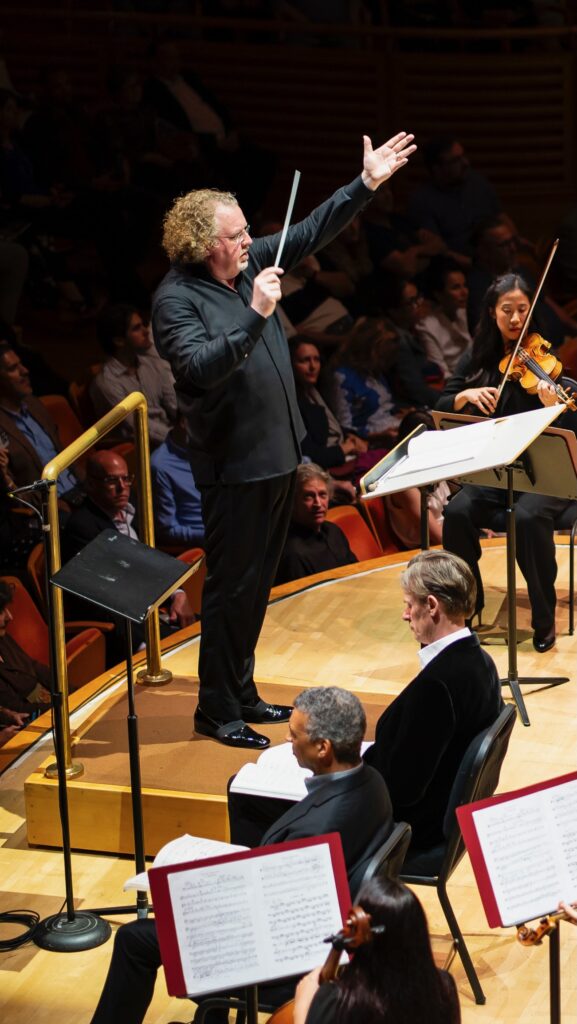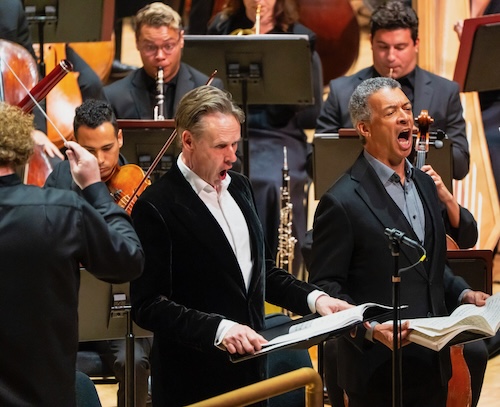Denève leads New World Symphony in a moving and powerful “War Requiem”

Stéphane Denève conducted the New World Symphony and guest artists in Britten’s War Requiem Saturday night at the Arsht Center.
Coventry Cathedral was destroyed by German bombing during World War II. The consecration of the rebuilt cathedral in 1962 brought a commission from the Church of England for Benjamin Britten to create an original work for the occasion. Eschewing a celebratory choral work for the rebirth of the church, Britten wrote his War Requiem.
To conclude “Resonance of Remembrance,” its series commemorating the 80th anniversary of the end of the war and the Holocaust, the New World Symphony presented Britten’s opus Saturday night at Miami’s Arsht Center. The performance was a prime project for artistic director Stéphane Denève and the inspired reading he drew from the massed forces lived up to the occasion.
Even by the standards of the prolific Britten, the War Requiem is an adventurous and challenging composition. Britten inserted war poems of Wilfred Owen between sections of the traditional mass for the dead. Owen was a British soldier who died at age 25 fighting in the trenches in France just one week before the armistice that ended the conflict. His poems are replete with graphic imagery, depicting the brutality of war and its victims.
Britten scored his work for large chorus and orchestra, a children’s chorus, a chamber orchestra and three vocal soloists. The baritone and tenor depict the soldiers of Owen’s writing while a soprano is part of the choral contingent, singing the Latin mass.
As Denéve has pointed out, the score is, ultimately, a plea for peace and reconciliation, not vengeance. Sadly, that message remains as potent today, in a world torn by wars and conflict, as it was over 60 years ago when Britten penned his composition.
Both powerful and deeply moving, the work’s choral and orchestral writing is alternately austere and thunderous. (Britten said he was influenced by the Requiem settings of Mozart and Verdi.) The children’s chorus, sounding in the distance, seems to come from a different world. Many of the children’s interludes recall carols or anthems, a calming influence on the surrounding drama of death and pleas for mercy and forgiveness. The Owens settings are more intimate, at times like lieder, accompanied by chamber orchestra, while the soprano line soars both in drama and ecstasy. Britten’s piece is a singular creation that can be difficult for performers and listeners alike but one which is highly rewarding.
Denève’s direction captured every nuance and mood swing of Britten’s sprawling combination of vehement agony and repose. He built the churning opening orchestral and choral figurations in carefully guided layers. The voices of the Master Chorale of South Florida were full, unified and resonant while alert to every nuance of Denève’s wide dynamic range. Both the terror of the day of wrath in the “Dies irae” and the calm prayer for peace of the “Libera me” that concludes the requiem on a quiet evocation were vividly projected. The chorus’ stellar singing was a tribute to director Brett Karlin whose tenure with the ensemble has been transformational. (Karlin received some of the loudest cheers at the performance’s conclusion.)
Placing the chamber instrumental forces at stage right. Denève brought clarity to Britten’s delicate coloration that supports the male soloists, with the wind and harp strains especially detailed and present. Soft and subtly contoured, the sounds of the Florida Singing Sons (under Daniel Bates and Malcolm Rogers) and Girl Choir of South Florida (under Sylvia Rose Aycock) emerged as coming from another realm. Denève’s coordination of the divergent forces was masterful. From brass proclamations to searing string attacks, the New World fellows were in top form.
Ian Bostridge is the Britten tenor par excellence. With a voice both lyrical and strong, his top tones emerged lovely and caressing. His poignant solo in the “Agnus dei” was marked by intensity of utterance and depth of feeling.
Roderick Williams’ light baritone, with a warm and burnished timbre, made Owen’s words telling, fully proclaiming the tragedy of war. His riveting narrative “After the blast of lightening” was crisply delineated. In duos, Bostridge and Williams’ voices were well matched and blended to both robust and sensuous effect. In the “Offertorium,” Britten revisited his 1950 canticle about the Biblical tale of Abraham and Isaac but, this time, in a darker and more cynical manner. In this version, Abraham ignores the angel’s commandment and kills his son. Suggesting a parallel to the tragedy of war, Bostridge and Williams sang, alternately, with vehemence and dulcet timbre. Their iteration of two dead soldiers in Owen’s “Strange Meeting” sounded, sotto voce, almost like they were singing from the grave.
Stationed at the center of the choir loft, Christine Goerke’s first entrance had laser-like focus and strength, her penetrating soprano ringing in the upper register but dark and solid at lower extremes. Her voice turned radiant and ravishing in the lyrical outpouring of the “Lacrimosa” with Denéve perfectly molding the accompanying choral backdrop. Her voice rose over ringing bells for the final softly contoured “Amen,” the chorus at the limit of audibility. At the sounding of the last bars, Denève held his hand in the air for almost a minute, allowing the spell to remain unbroken before acknowledging applause.
While a few audience members left the hall in mid-performance, the overwhelming majority stayed and gave the conductor, choral directors and soloists a rousing ovation. The three soloists repeatedly joined in applauding the orchestra and choral forces. This Britten performance was a high water mark for Denève’s leadership and enterprising programming that enriched both players and listeners.
Michael Tilson Thomas conducts Beethoven’s Symphony No. 5 and Schumann’s Piano Concerto with Yefim Bronfman. Alasdair Neale conducts Strauss’ Death and Transfiguration 8 p.m. March 29 and 2 p.m. March 30 at the New World Center in Miami Beach. nws.edu
Posted in Performances
Leave a Comment
Sun Mar 16, 2025
at 12:30 pm
No Comments
